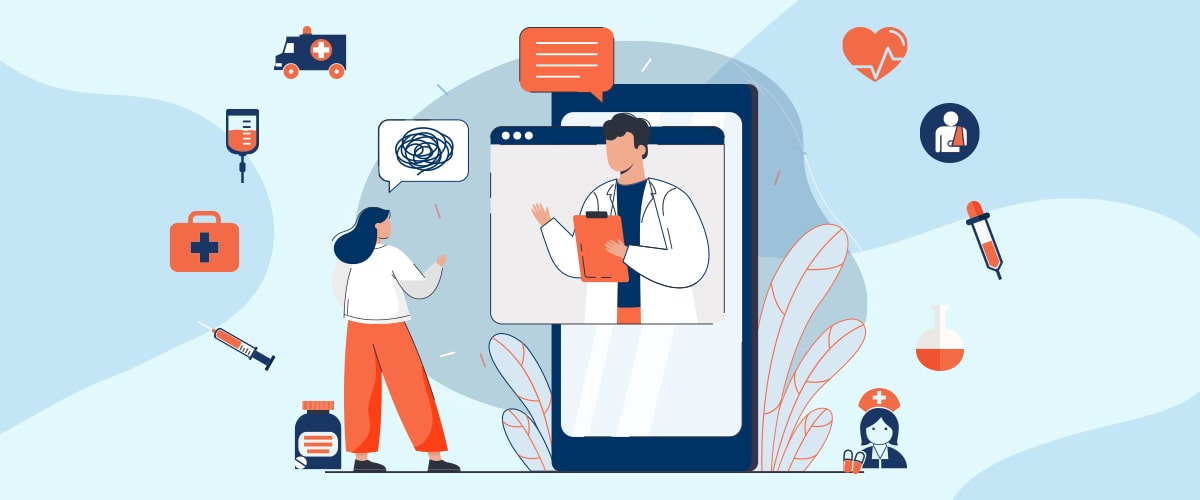Starting a healthcare business requires a thorough analysis of ideas, trends, and development steps. We have made a detailed plan for the mobile healthcare app development process in this issue. Therefore, We explain what a healthcare app is, clarify all the nuances, and give tips on creating a digital health app MVP. So sit back, relax and enjoy reading!
Health app development refers to creating an application for mobile devices that helps users effectively manage illnesses, fitness goals, hospital visits, and insurance claims. Therefore, This includes telemedicine, checking test results, managing prescriptions and appointments, etc.
What is a Healthcare App?
Healthcare is very broad and includes various applications, from professional to simple. The purpose of Healthcare apps development also varies. Therefore, Mobile health apps simplify our lives by tracking health data, ensuring remote assistance, providing 24/7 doctor services, and providing tips to improve our health. In general, the goal depends on which type of application you choose.
When looking for health app developers, these categories must be kept in mind as they need to provide input data. Let’s take a look at the available categories.
Types of Healthcare App Development
The different types of Health solutions available today target three audiences: patients, medical staff, and administration. It is undoubtedly useful to know these before developing a health application.
Health Apps for Patients
- Appointment Scheduling and Reminders
- self-diagnosis
- habit tracking
- fitness and health
- Social network
- telemedicine
- Mental Health
- IoT Medical Devices
- women’s health
Vendor-Based Health Apps
- remote patient monitoring
- telemedicine
- Diagnostics
- electronic medical records
- medical referral
- Hospital ERP
- clinical communication
- Appointment management
Health Apps for Healthcare Professionals
- Doctors and Nurses Market
- EMR/EHR
- Inventory management
- Bill
- Clinic Management Application
Therefore, there are many opportunities to develop healthcare applications, whether IOS or Android.
The Benefits of Healthcare Apps for Doctors and Patients
One of the reasons healthcare app development is booming is that they meet the huge demand from both patients and physicians. Here are some of the key benefits of healthcare apps.
Mobile Healthcare App Development Advantage
Remote support
Mobile health apps allow doctors to track patients’ health even when away. Therefore, Doctors can also connect with patients by phone, video chat, or through an app, saving the hassle of seeing patients.
Efficient workload distribution
The app development of healthcare applications enables doctors to schedule appointments at the best time. Therefore, They can also manage necessary tasks through mobile and web apps.
Brand awareness.
Lack of loyalty and trust is as dangerous as a toothache. A health app can increase awareness of clinics and doctors. Therefore, getting treatment in a clinic with a digital presence can help increase patient trust and loyalty. Therefore, they are more likely to choose the same clinic next time.
They were Ultimately Designed for Scalability
When the first version of an application is released, it is often limited in functionality. As mentioned earlier, smaller, more targeted applications solve specific problems and are more valuable to end-users.
However, applications should be extensible from the start. Therefore, User and personal research expand over time, and you’ll find extensions and features that will improve your app or take it to a whole new level. Knowing regulations and design guidelines from the outset can save a lot of time and money. Read more about the business benefits of design.
What do Patients want from Mobile Health Applications?
Patients typically expect three basic functions: the ability to schedule and cancel appointments, request prescriptions, and have easy access to medical records. Therefore, it means Mobile healthcare app development has gone to a new level that has become a need.
The data shows that only 11% of hospital apps offer these features. Therefore, only 2% of hospitals can enrol patients with healthcare apps, which is even more worrying. This is a great initiative on the end of the User and doctor.
For healthcare applications, it is important to provide functionality in the most user-friendly way. It sounds simple, but few healthcare applications successfully implement these two key elements in reality.
As can be seen from these data, healthcare organizations have an excellent opportunity to improve the patient experience through mobile applications.

